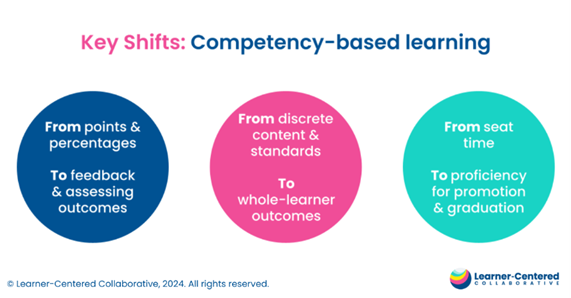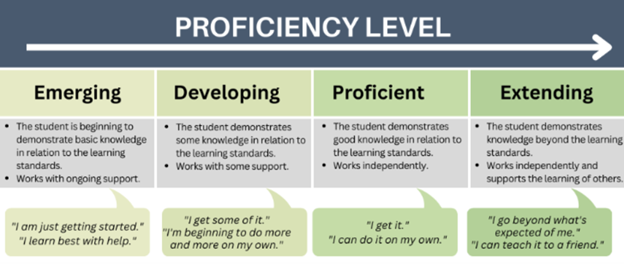“Will this be on the check?”
If that query instantly makes your coronary heart race, muscular tissues tense, or your face do an unflattering cringe kind of expression, you’re not alone. This query used to right away spike my blood stress too, till I noticed I wasn’t really annoyed with the query itself and even the coed who requested it, however I used to be annoyed with the tradition we’ve created in training that influences this kind of conduct.
Many college students method their training with a slim purpose: examine laborious, ace the examination, and get an A within the class. It could actually really feel disappointing when college students appear to solely care about what will probably be on the check or how they will cut price to bump up their grades, in comparison with studying and making use of new information to real-world experiences. Conventional grading programs have a tendency to spotlight efficiency above progress and prioritize short-term achievements over long-term progress. This method not solely confines deeper studying but in addition limits college students’ understanding of what success in training really means. Various grading strategies that help important pondering and significant reflection, like competency-based grading, can successfully promote pupil studying and improve engagement.
Level-Chasing vs. Progress-Making: When Studying Takes the Lead
Conventional grading programs typically:
- Emphasize level accumulation reasonably than true comprehension
- Embody punitive penalties for errors with out providing an opportunity to revisit/enhance early coursework
- Encourage a give attention to “ultimate” grades as a substitute of steady studying and progress
Conventional grading will also be inconsistent (“Conventional Grading Techniques vs. Requirements-Primarily based Grading Techniques” 2023). A pupil who solely partially understands the content material would possibly cross with the applying of additional credit score or a grading curve, whereas one other pupil who makes important progress over time should fail merely as a result of early struggles that can not be counterbalanced. As educators in greater training, we acknowledge that studying isn’t all the time linear; so why do our grading practices assume it’s?
Assembly College students The place They Are: What’s Competency-Primarily based Grading?
Competency-based grading promotes a number of alternatives for college students to display proficiency in particular abilities or studying outcomes as a substitute of assigning a single rating or high-stakes cross/fail grade to an task (Townsley and Schmid 2020). Along with information, this framework assesses anticipated pupil attitudes and abilities in a progressive design that holds college students accountable. You will need to outline clear studying outcomes together with a constructive suggestions course of to information future improvement towards mastery. Naturally, this method shifts the main focus from a ultimate judgment to ongoing progress and enchancment. If a pupil doesn’t meet expectations for a sure ability, they aren’t confronted with a everlasting lack of factors however as a substitute may remediate and take a look at once more. (Hanson n.d.)

Placing Mastery into Movement: Methods to Get Began
Transitioning from a conventional grading system is usually a daunting job. Listed below are six useful methods to get began:
- Begin small. Until this system is finishing a complete curriculum redesign, remodeling your whole course abruptly just isn’t really useful and would doubtless overwhelm you and the scholars alike. Pilot competency-based grading by making use of it to a single task or unit taught throughout the course.
- Outline clear studying outcomes. Determine the precise abilities and competencies all college students ought to have the ability to display. Guarantee outcomes are particular, measurable, and student-centered. For instance, “will display correct hand hygiene utilizing aseptic method” is preferable to “will perceive correct hygiene practices”.
- Use outcome-driven rubrics. Competency-based training intently aligns with backward design, so use the decided studying outcomes to construct instantly correlated rubrics. Concentrate on mastery, not factors. Permit college students to entry the rubrics prematurely. Describe what “competent” appears like by offering particular standards with behavioral statements for various ranges of accomplishment and supply routine formative suggestions on how college students can enhance if they don’t meet expectations. Among the identical assignments can be utilized, however the methodology of evaluation adjustments.
- Use a 4-point scale (or related) to evaluate pupil progress. Competency-based grading focuses on college students demonstrating mastery of particular studying goals reasonably than accumulating factors. (“Extending Our View of Extending” 2022)

- Plan for remediation actions. Incorporate alternatives for revision/resubmission makes an attempt or re-demonstrations into the course schedule. For feasibility, set limits on the overall variety of resubmissions/re-demonstrations allowed or set a particular timeframe comparable to inside one week of receiving college suggestions.
- Focus your suggestions. Keep away from commenting on all the things and as a substitute, attempt to spotlight one or two precedence areas to information college students towards focused enchancment and preserve a manageable workload. Supply well timed individualized help and suggestions based mostly on every pupil’s wants. (Farah 2021; Townsley and Schmid 2020)
Troubleshooting the Transition
Challenges are anticipated to accompany any change however can normally be mitigated with some considerate planning. Though greater training appears to collectively be transferring towards competency-based grading, some college could expertise resistance from their college friends and learners. Being clear by sharing the rationale behind the change and the way it will profit college students may help improve understanding and engagement from each events. Offering real-world examples on this space and the highly effective influence competency-based training has already had on studying is an influential bonus! College could categorical legitimate considerations centered across the elevated workload associated to time and extra useful resource calls for needed for achievement. Since remediation takes effort and time from college students and school alike, make sure you set clear limits on remediation assignments and the method for completion. Be the instance you set for others by using out there sources and searching for out skilled improvement alternatives to extend your information. A number of on-line instruments, together with evaluation builders, suggestions templates, and progress-tracking packages, can help college in sustaining consistency and effectivity in competency-based grading implementation.
What You Acquire When You Grade for Progress
After making the transition and providing a extra personalised and reflective studying expertise, college students focus extra consideration on what they’re studying versus what grade they’re getting. Their confidence and willingness to take educational dangers will increase whereas nervousness decreases with out the concern of irreversible grade penalties taking over actual property of their thoughts. As a substitute of asking “What number of factors did I lose?”, college students begin asking “How can I enhance or make that higher?” – which is inspiring! Grading for progress isn’t about reducing educational requirements. It’s about redefining significant studying and reshaping expectations. Minor adjustments can result in main transformation. Take step one and be ready to marvel at what occurs when college students are empowered with the instruments and encouragement to develop.
Lisa Pitzer, DNP, MSN, RN, CNE, CNE-cl, serves as an Assistant Professor of Nursing at Saint Francis Medical Heart Faculty of Nursing in Peoria, Illinois. On this function, she oversees the Nursing Useful resource Heart Simulation Laboratory and offers instruction in fundamentals and medical-surgical nursing. Dr. Pitzer is a Licensed Nurse Educator and Licensed Tutorial Medical Nurse Educator whose scholarly pursuits give attention to simulation-based pedagogy, curricular innovation, and advancing pupil success in nursing training. She is an energetic member of the Nationwide League for Nursing, the American Affiliation of Schools of Nursing, and Sigma Theta Tau Worldwide Honor Society of Nursing.
References
“Extending Our View of Extending.” My Progress Mindset, March 6, 2022. https://mygrowthmindset.home.blog/2022/03/06/extending-our-view-of-extending/.
Farah, Kareem. “How one can Set Up Mastery-Primarily based Grading in Your Classroom.” Cult of Pedagogy, September 2021. https://www.cultofpedagogy.com/mastery-based-grading/.
Hanson, Ben. “3 Key Shifts from Conventional Grading to Competency-Primarily based Studying and Evaluation.” Learner-Centered Collaborative. Accessed Could 22, 2025. https://learnercentered.org/blog/traditional-grading-to-competency-based-assessment/.
Townsley, Matt and Deron Schmid. “Various Grading Practices: An Entry Level for College in Competency-Primarily based Schooling.” The Journal of Competency-Primarily based Schooling 5, no. 3 (2020): 1–5. https://doi.org/10.1002/cbe2.1219.
“Conventional Grading Techniques vs. Requirements-Primarily based Grading Techniques.” KnowledgeWorks, 2023. https://knowledgeworks.org/resources/traditional-grading-vs-standards-based-grading/.


